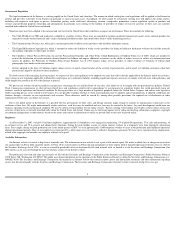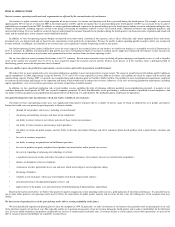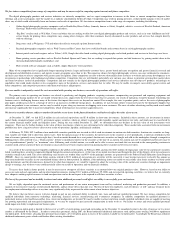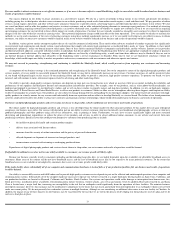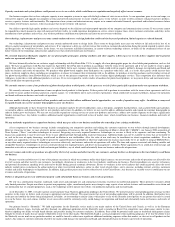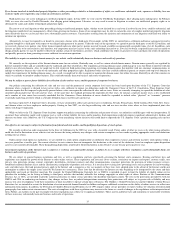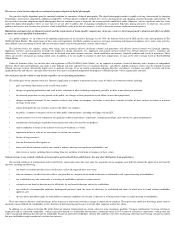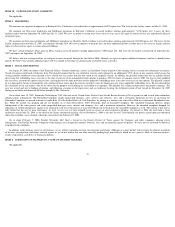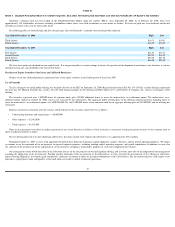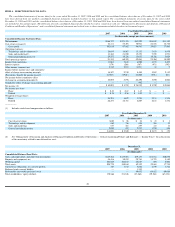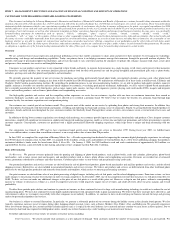Shutterfly 2008 Annual Report Download - page 23
Download and view the complete annual report
Please find page 23 of the 2008 Shutterfly annual report below. You can navigate through the pages in the report by either clicking on the pages listed below, or by using the keyword search tool below to find specific information within the annual report.
If we become involved in intellectual property litigation or other proceedings related to a determination of rights, we could incur substantial costs, expenses or liability, lose our
exclusive rights or be required to stop certain of our business activities.
Third parties may sue us for infringing its intellectual property rights. In June 2007, we were sued by FotoMedia Technologies, LLC alleging patent infringement. In February
2008, we were also sued by Parallel Networks, also alleging patent infringement. Likewise, we may need to resort to litigation to enforce our intellectual property rights or to
determine the scope and validity of third-party proprietary rights.
The cost to us of any litigation or other proceeding relating to intellectual property rights, whether or not initiated by us and even if resolved in our favor, could be substantial, and
the litigation would divert our management’
s efforts from growing our business. Some of our competitors may be able to sustain the costs of complex intellectual property litigation
more effectively than we can because they have substantially greater resources. Uncertainties resulting from the initiation and continuation of any litigation could limit our ability to
continue our operations.
Alternatively, we may be required to, or decide to, enter into a license with a third party. For example, in May 2005, we entered into a settlement and license agreement to resolve
litigation brought by a third party with respect to our alleged infringement of its patents. Under the terms of the agreement, we agreed to pay the third party a total of $2.0 million, and
we received a license to its patents. Any future license required under any other party’
s patents may not be made available on commercially acceptable terms, if at all. In addition, such
licenses are likely to be non-
exclusive and, therefore, our competitors may have access to the same technology licensed to us. If we fail to obtain a required license and are unable to
design around a patent, we may be unable to effectively conduct certain of our business activities, which could limit our ability to generate revenues and harm our results of operations
and possibly prevent us from generating revenues sufficient to sustain our operations.
The inability to acquire or maintain domain names for our website could substantially harm our business and results of operations.
We currently are the registrant of the Internet domain name for our website, Shutterfly.com, as well as various related domain names. Domain names generally are regulated by
Internet regulatory bodies and are controlled also by trademark and other related laws. The regulations governing domain names could change in ways that block or interfere with our
ability to use relevant domains. Also, we might not be able to prevent third parties from registering or retaining domain names that interfere with our consumer communications, or
infringe or otherwise decrease the value of our trademarks and other proprietary rights. Regulatory bodies also may establish additional generic or country-code top-
level domains or
modify the requirements for holding domain names. As a result, we might not be able to acquire or maintain the domain names that utilize the name Shutterfly in all of the countries in
which we currently or intend to conduct business. This could substantially harm our business and results of operations.
We may be subject to past or future liabilities for collection of sales and use taxes, and the payment of corporate level taxes.
Our policies concerning the collection of sales and use taxes and the payment of certain corporate level taxes has been based upon decisions of the U.S. Supreme Court that
determine when a taxpayer is deemed to have nexus with a state sufficient to impose tax obligations under the Commerce Clause of the U.S. Constitution. Those Supreme Court
decisions require that the taxpayer be physically present before a state can require the collection of sales and use taxes. States are currently attempting to expand the definition of what
constitutes physical presence for sales and use taxes. At the same time, the standard governing the imposition of other taxes, for instance, corporate income taxes, is less established
and a number of state courts have recently concluded that the Commerce Clause definition of nexus should be expanded to include either “physical” or “economic”
presence
(essentially marketing activities) which is a broader definition than is used for sales and use tax.
In reliance upon the U.S. Supreme Court’
s decisions, we have continued to collect sales and use taxes in California, Nevada, Pennsylvania, North Carolina, New York, New Jersey,
and Arizona where we have employees and/or property. Starting in June 2007, we also began collecting sales and use taxes in other states where we have implemented joint sales
efforts with Target Corporation.
While we believe the U.S. Supreme Court decisions support our policies concerning the collection and payment of taxes, tax authorities could disagree with our interpretations. If
sustained, those authorities might seek to impose past as well as future liability for taxes and/or penalties. Such impositions could also impose significant administrative burdens and
decrease our future sales. Moreover, the U.S. Congress has been considering various initiatives that could limit or supersede the U.S. Supreme Court’
s position regarding sales and use
taxes.
Our effective tax rate may be subject to fluctuation from federal and state audits, and disqualifying dispositions of stock options.
We recently resolved an audit examination by the State of California for the 2003 tax year, with a favorable result. Future audits of other tax years or by other taxing authorities
could also lead to fluctuations in our effective tax rate because the taxing authority may disagree with certain assumptions we have made regarding appropriate credits and deductions
in filing our tax returns.
Under current stock option tax regulations, we are entitled to a stock option compensation tax deduction when employees exercise and sell their incentive stock options within a
two year period for a taxable gain. Our current effective tax rate estimate does not incorporate this deduction as the extent of the deduction, based on employee option disposition
activity is not currently determinable. These disqualifying dispositions could lead to future fluctuations in our effective tax rate for any given quarter or year.
Government regulation of the Internet and e-
commerce is evolving, and unfavorable changes or failure by us to comply with these regulations could substantially harm our
business and results of operations.
We are subject to general business regulations and laws as well as regulations and laws specifically governing the Internet and e-
commerce. Existing and future laws and
regulations may impede the growth of the Internet or other online services. These regulations and laws may cover taxation, restrictions on imports and exports, customs, tariffs, user
privacy, data protection, pricing, content, copyrights, distribution, electronic contracts and other communications, consumer protection, the provision of online payment services,
broadband residential Internet access and the characteristics and quality of products and services. It is not clear how existing laws governing issues such as property use and ownership,
sales and other taxes, libel and personal privacy apply to the Internet and e-
commerce as the vast majority of these laws were adopted prior to the advent of the Internet and do not
contemplate or address the unique issues raised by the Internet or e-
commerce. Those laws that do reference the Internet are only beginning to be interpreted by the courts and their
applicability and reach are therefore uncertain. For example, the Digital Millennium Copyright Act, or DMCA, is intended, in part, to limit the liability of eligible online service
providers for including (or for listing or linking to third-
party websites that include) materials that infringe copyrights or other rights of others. Portions of the Communications
Decency Act, or CDA, are intended to provide statutory protections to online service providers who distribute third-
party content. We rely on the protections provided by both the
DMCA and CDA in conducting our business. Any changes in these laws or judicial interpretations narrowing their protections will subject us to greater risk of liability and may
increase our costs of compliance with these regulations or limit our ability to operate certain lines of business. The Children’s Online Protection Act and the Children’
s Online Privacy
Protection Act are intended to restrict the distribution of certain materials deemed harmful to children and impose additional restrictions on the ability of online services to collect user
information from minors. In addition, the Protection of Children From Sexual Predators Act of 1998 requires online service providers to report evidence of violations of federal child
pornography laws under certain circumstances. The costs of compliance with these regulations may increase in the future as a result of changes in the regulations or the interpretation of
them. Further, any failures on our part to comply with these regulations may subject us to significant liabilities. Those current and future laws and regulations or unfavorable resolution
of these issues may substantially harm our business and results of operations.
15


